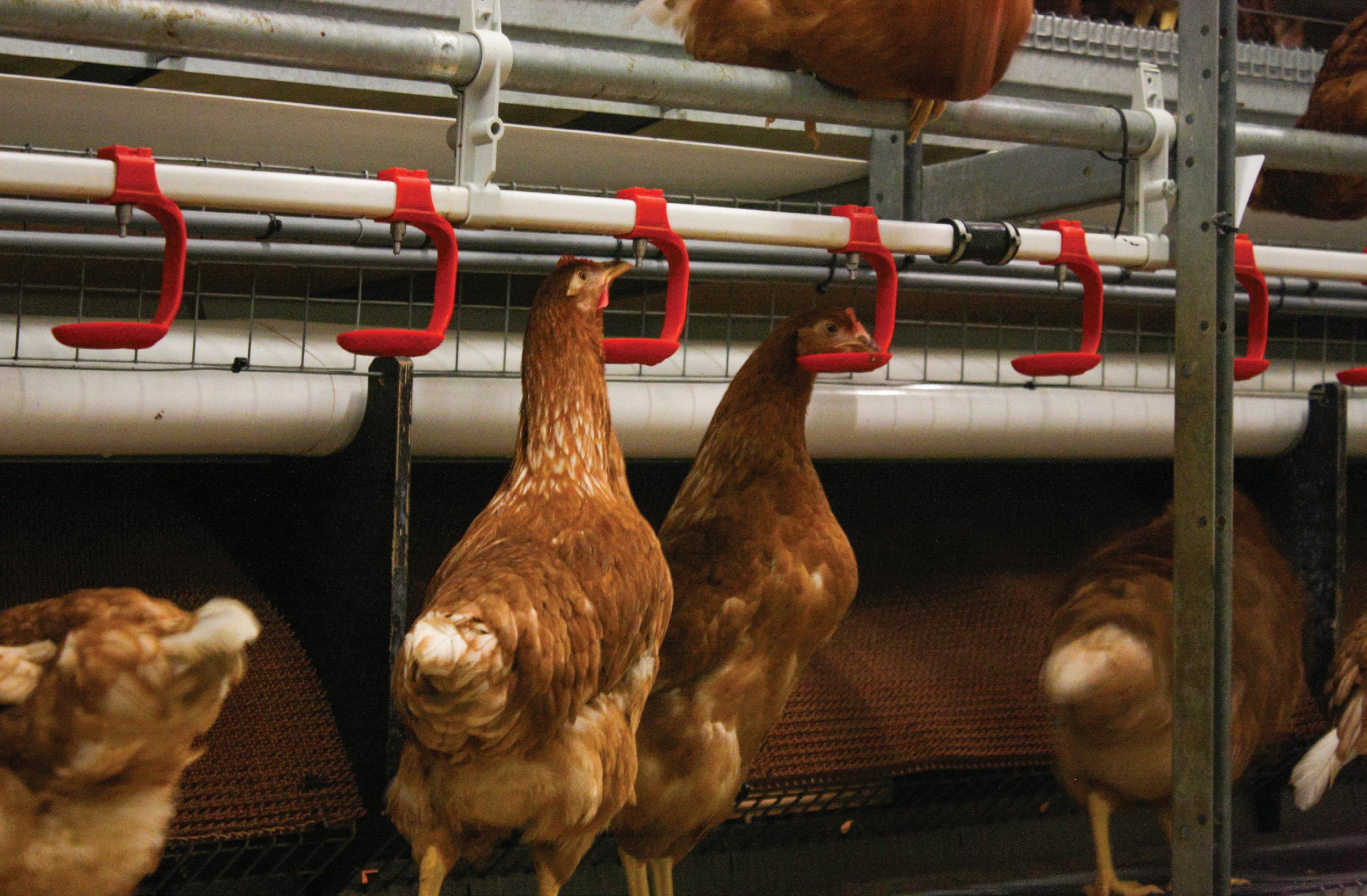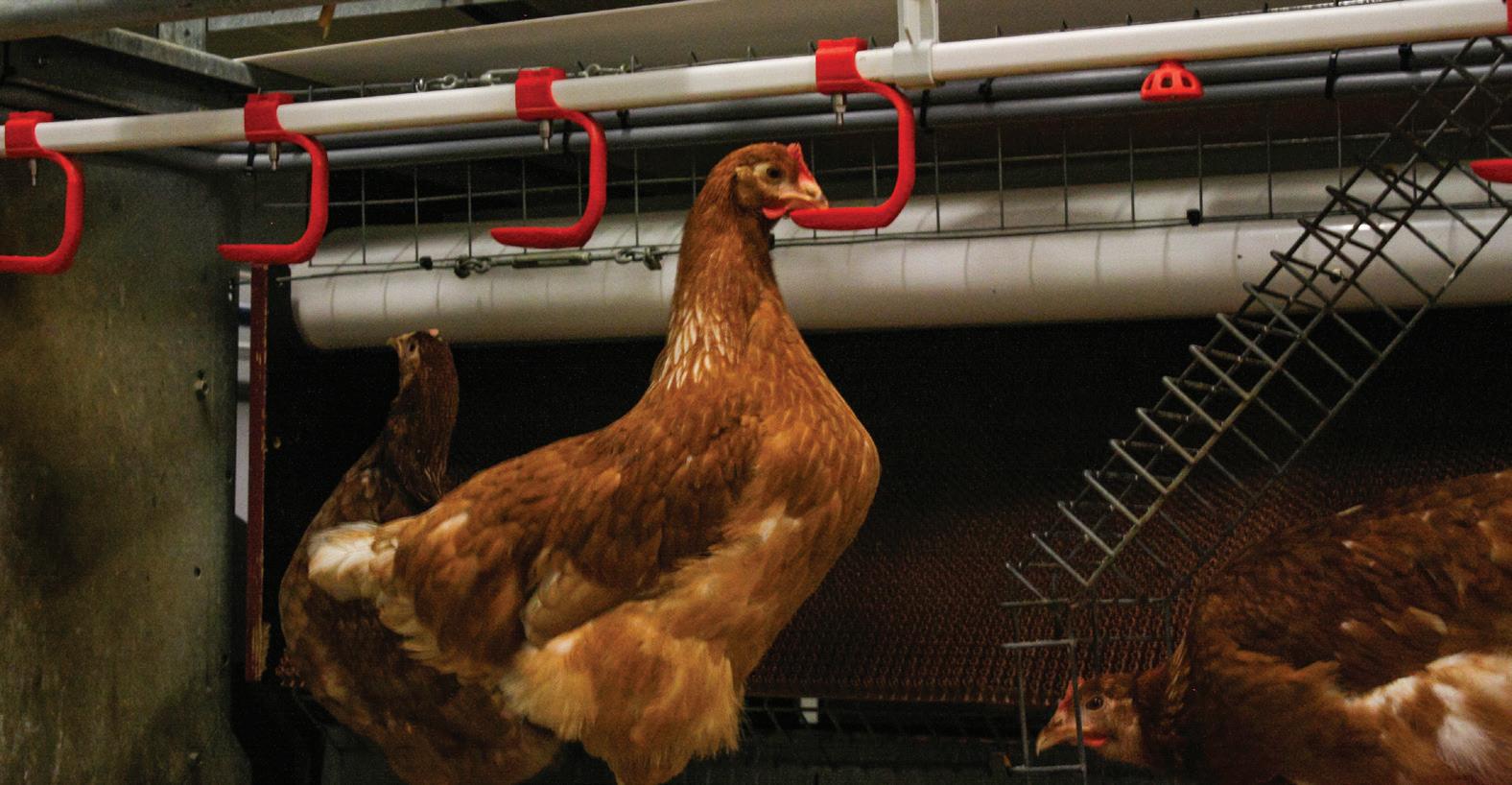
3 minute read
Poultry
WANT TO REDUCE SPILLAGE OF UNTRIMMED LAYING HENS?
Since the introduction of the ban on beak trimming, untrimmed laying hens have had more difficulty drinking from the drinking nipples. They tend to spill more, and their water intake can decrease. This can ultimately have a negative effect on the health and performance of the hen. But how can you prevent this?
Advertisement
Untrimmed laying hens drink differently than trimmed laying hens. In contrast to trimmed hens, untrimmed hens peck the nipple with a bent head. For this reason, they have to make more effort to drink water and ultimately spill more. As a result, some hens may not drink enough water and perform poorly. Monitoring water consumption can be a useful tool for determining whether the animals are drinking enough but, due to the spillage, these results may not be accurate and can ultimately mislead you. Walking through the house and observing the hens’ drinking behaviour with your


own eyes is still one of the best ways to detect problems.
What to do in the event of excessive spillage
Here are several ways you can maintain the water intake of your untrimmed laying hens and reduce spillage.
1. The height of the drinking line
This can be an important point of attention, especially at the start of a new round. The height of the drinking line can be a problem for young, untrimmed laying hens. Because they turn their heads to peck at the nipple, they have to reach further, and when the line is too high they will spill more. Lowering the lines, if possible, or placing an elevation of some sort below the drinking line makes it easier for the hens to reach the nipple.
2. 360 degrees drinking nipples
Impex has conducted extensive research and concluded that a 360 degrees drinking nipple, such as the I-Flex 14-SP, is the ideal nipple for untrimmed laying hens and results in considerably less spillage. Thanks to the manoeuvrable pin, the hens do not necessarily have to approach the nipple with a straight neck from below to activate it. They can also approach it with a bend head, making it easier for them to drink the water. Moreover, because this nipple closes faster than a normal nipple, the spillage is also significantly reduced.
3. Drip cups
The use of drip cups reduces spillage, because the water the hens spill while drinking is collected in the cups. Hens who have difficulty drinking from the drinking nipples will gladly drink the spilled water from the cups. However, it is important to ensure that the drip cups are kept clean so the hens do not ingest contaminated water and thereby incur potential intestinal health problems.
4. Correct water pressure
Incorrect water pressure can also cause problems. Excessive water pressure will cause the water to spray out as soon as the nipple is activated. This increases spillage and makes it more difficult for the untrimmed laying hens to drink the water. On the other hand, insufficient water pressure can result in the hens not drinking enough water, because too little water is being released. More importantly, if the water pressure is too low the water will not be properly distributed along the lines and the farthest reaches of the lines will not release any water at all. When setting the water pressure, pay close attention to the hens’ preference to ensure optimum water consumption and reduce spillage.
5. Water quality
Water quality can be easily monitored through use of a biofilm sensor, and you will be notified immediately if any biofilm formation is detected in the lines. These problems can be easily solved through the use of automatic flushing systems, such as the I-Flush. It is also advisable to regularly take samples from the water source to ensure that everything is as it should be.
Optimal production results
Correct drinking water management is important to optimize the results of your poultry production. Although the water supply seems to be a very small part of a complete production, water is the most important nutrient for a laying hen to perform optimally. That is why it is also extremely important to devote sufficient time and attention to drinking water to ultimately achieve maximum results.
For more information, please contact Sabrina Kas, Marketing & Communication, Impex Barneveld B.V. sabrina@impex.nl












